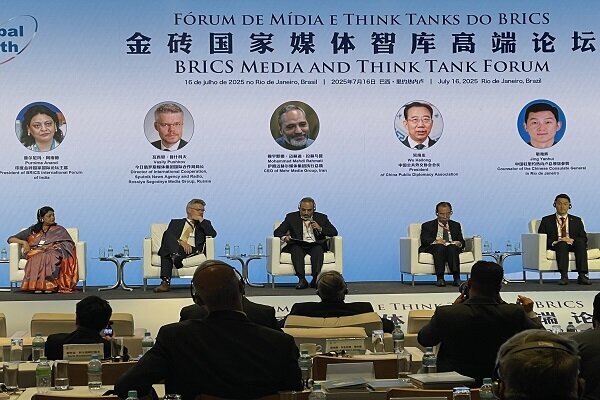Mehr CEO calls for independent media narratives to counter global distortions at BRICS conference

TEHRAN – Mohammad Mahdi Rahmati, the CEO of Mehr Media Group (which consists of Mehr News Agency and English-language daily Tehran Times) emphasized the vital role of media in providing independent narratives to prevent distortion of the truth within mainstream outlets during the seventh BRICS Media and Think Tank Forum in Rio de Janeiro, Brazil on Thursday.
In his keynote speech at the plenary session, Rahmati underscored the importance of multilateral media collaboration, supporting equitable content production and distribution, promoting authentic independent narratives, and the role of media in shaping a fair, multipolar global order.
He further highlighted BRICS’ potential to redefine global governance and called for active participation by member media outlets in pursuing the aspirations of developing nations, reforming international economic institutions, clarifying the consequences of unilateral policies, and informing about joint economic projects.
Rahmati also addressed ongoing Israeli aggressions against Gaza, emphasizing the crucial role of independent media in portraying the humanitarian aspects of conflicts and illegal acts by Western countries. He stressed that independent narratives could prevent the distortion of truth in dominant media landscapes.
The seventh gathering of media representatives from BRICS nations and several countries from the Global South took place in Rio de Janeiro from July 15 to 17. The event aimed to expand media cooperation, counter unilateral narratives, and strengthen communication channels among Global South nations.
Iran’s delegation was represented by Mehr Media Group.
During the session, Daria Ivankova, Director of the TV BRICS International Cooperation Department, stressed the importance of expanding media ties to build a unified positive agenda and deepen cultural exchange.
She also highlighted the influence of media in shaping global public opinion and called for enhanced south-south media cooperation, development of joint projects in culture, education, tourism, and economy, multilingual content production, and leveraging new technologies like AI for content creation and dissemination. She also emphasized investing in the education of future journalists across BRICS countries and referenced collaborative projects with Mehr News Agency.
The opening segment featured speeches by notable figures such as Fu Hua, President of Xinhua News Agency; Mikhail Gousman, First Deputy General Director of the Russian news agency TASS; Marida Fernandez Lopez from the Cuban Communist Party; and British thinker Martin Jacques.
Key topics discussed during the conference included the future of BRICS media cooperation, countering hegemonic and unilateral narratives, capacity-building in developing countries, establishing shared media infrastructure, and designing communication models for the Global South.
Additionally, the launch of the “South Global Media Union” was announced, aiming to foster media cohesion and synergy among developing nations. The union’s objectives include enhanced information exchange, professional capacity-building, and increasing the Global South’s influence in international communication frameworks.
BRICS currently comprises China, Russia, India, Brazil, South Africa, with new members such as Iran, Saudi Arabia, Egypt, UAE, and Ethiopia. The BRICS Media Conference functions as an advisory and specialized body dedicated to promoting media collaboration and content synergy among member states, held annually to strengthen collective media efforts.
SAB/
